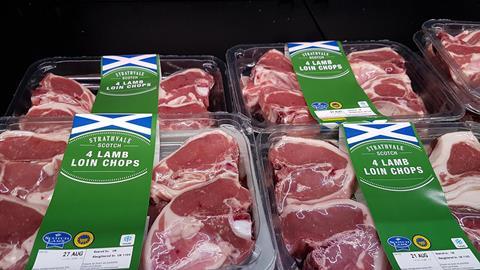Phase Two of the National Farmers' Union (NFU) Scotland ShelfWatch survey has been published, finding a 10.9% increase of own-label Scottish beef stocked in retailers compared to the Phase One results.

The ShelfWatch survey, which was conducted by an independent research firm, looked at the availability of Scottish produce across 73 stores in mainland Scotland.
Phase Two of the survey found that Aldi remained the "strongest supporter of Scottish goods", with 45% of produce available to consumers being Scottish. Co-op improved from fourth to second (27.6%). Lidl (27%) fell from second to third and Morrisons fell from third to fourth (19.2%).
Sainsbury's remained the lowest supporter of Scottish own-label produce (9.7%) while Tesco improved from seventh to sixth (13.1%), Asda fell from sixth to seventh (11.5%) and M&S remained at fifth (18.7%).
Retailers were notified 24 hours ahead of the audit and have received a copy of the results.
Beef
NFUS said that on average there was an increase of 10.9% of Scottish beef in own-label versus January's ShelfWatch. It also found that Scottish beef held a "strong majority" in own-label products (58.2%) followed by UK (40.7%) and Irish (1%).
Aldi continued to have the largest proportion of Scottish beef (84%), a 2.4% decrease from its January results. Sainsbury's stocked the least amount of Scottish beef (17.4%) but was the only supermarket to also stock Irish beef (6%).
NFU Scotland said Tesco had made the "biggest improvement" on January, increasing the proportion of Scottish beef by 58%.
Lamb
The proportion of Scottish lamb dropped to an average of 31.3% of own-label products, which was down 4.5% on the January rates. NFU Scotland found that the UK held the largest proportion (52.3%) of own-label lamb.
Lidl stocked the most Scottish lamb at 90.9% of own label, while Asda stocked no Scottish lamb, 58% "other" and a minority of 42% British lamb. Co-op also did not stock Scottish lamb, but it did stock 100% British lamb.
According to NFUS, Aldi made the biggest improvement since January, increasing its proportion of Scottish lamb by 9.3%.
Pork
NFUS said that the pork ShelfWatch was revised from Phase One by assessing fresh pork, bacon and sausages separately.
The survey found that Aldi was the only retailer supplying Scottish pork in all three categories. Aldi and Lidl stocked Scottish pork, with Aldi having the highest amount of fresh Scottish pork at 100%.
Co-op, M&S, Morrisons, Lidl and Sainsbury's all exclusively stocked British fresh pork, while both Asda (33%) and Tesco (15%) had "considerable quantities" of imported German, Dutch and Danish pork.
Aldi, Lidl and Sainsbury's all had Scottish bacon, with NFUS reporting that the former two were "leading the way" but still stocked only 10% at most.
All retailers imported "significant quantities" of bacon from Europe. Lidl and Aldi imported 87% and 74% respectively and Sainsbury's carried the lowest quantity of imports at 44%.
Aldi (39%) and Lidl (8%) were the only retailers to stock Scottish sausages, as the other retailers used 100% UK pork for their sausages.
Chicken
Aldi had the highest percentage (87%) of Scottish chicken, with the remainder coming from the UK. Four of the retailers - Asda, Lidl, Sainsbury's and Tesco - had no Scottish chicken and were 100% UK.
Asda, Co-op, Lidl and Morrison all saw a "significant drop" in the quantity of Scottish chicken in their store, with Asda and Lidl showing no Scottish chicken at all anymore.
NFU Scotland also noted that there was no imported fresh chicken in any of the surveyed retailers.
Phase Two "only a modest increase" in Scottish produce
Martin Kennedy, president of NFU Scotland, said: “The first ShelfWatch project in January gave us a useful baseline. It allowed us to understand the differences between product types, where Scottish produce is to the fore and where there is dominance from produce from elsewhere.
“The second of four ShelfWatch surveys to be carried out within the 12 month period has found only a modest increase in the availability of Scottish branded products. This now gives us a solid platform for more detailed discussions with retailers and policy makers which we will now embark in order to try and affect positive change."
Kennedy continued: “Part of that dialogue will be on fair and transparent labelling. The ability for a staple product like bacon to carry ambiguous and confusing labelling on whether it is of UK or EU origin underlines our previous calls for labelling reform at a UK Government level.
“We know that our primary producers provide fantastic products, to the highest welfare standards. This is something that we are justifiably proud of.
“We will continue to work hard on behalf of our members to ensure that they are at the forefront of discussions as we seek to secure a fairer share of returns from the marketplace on their behalf.”















